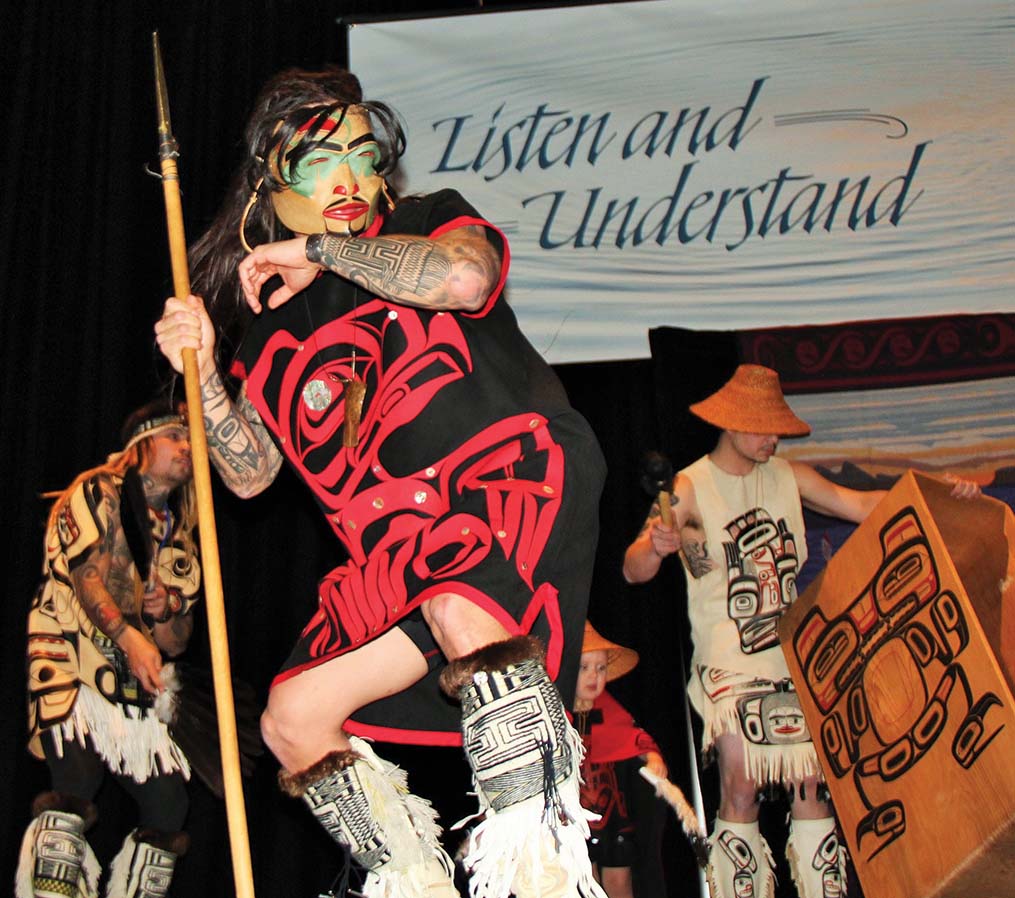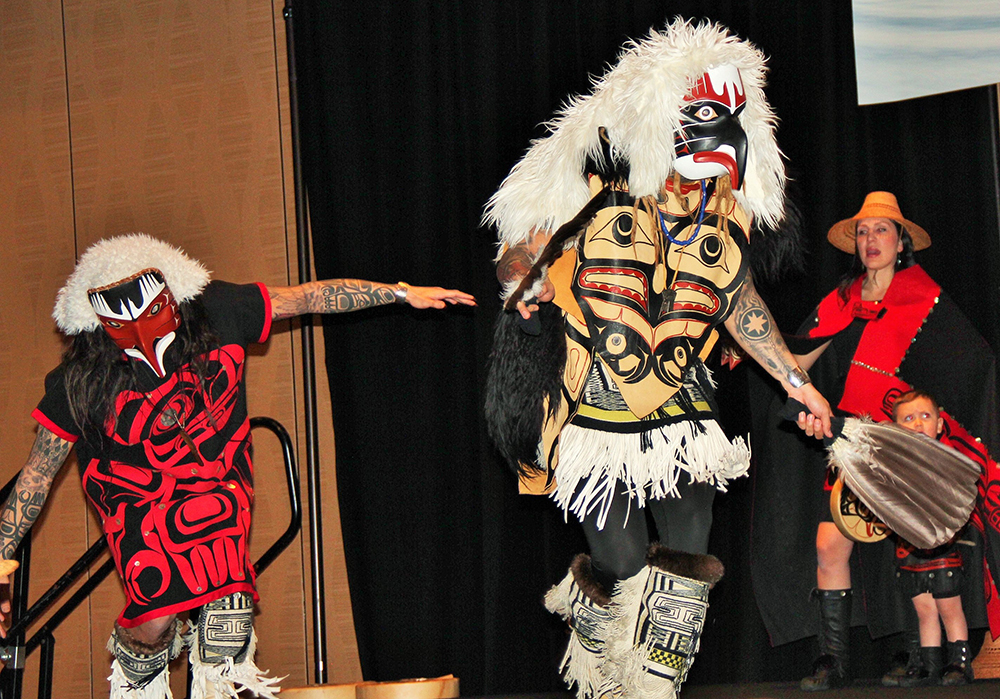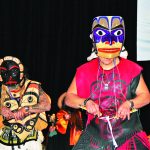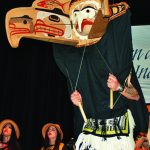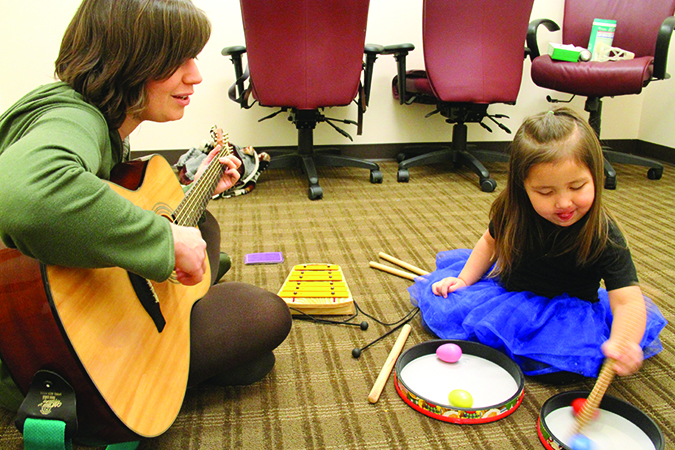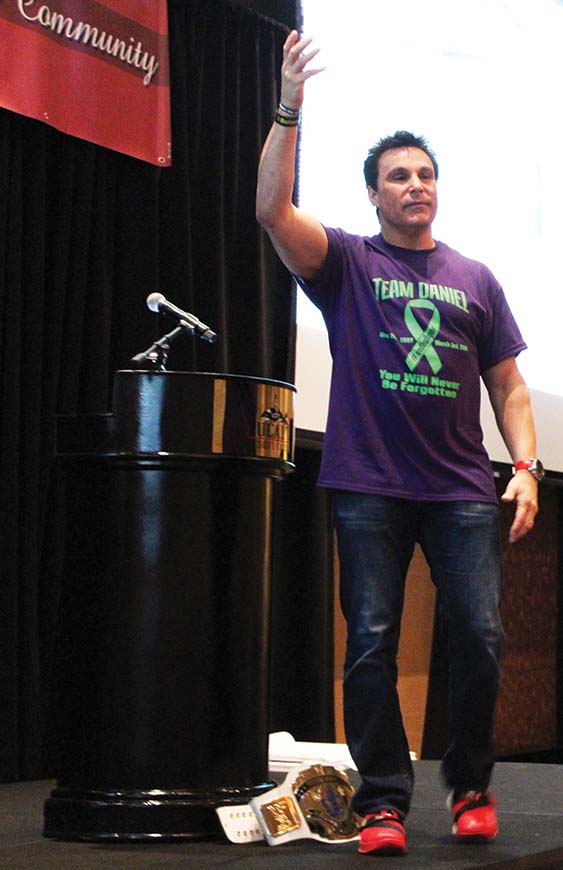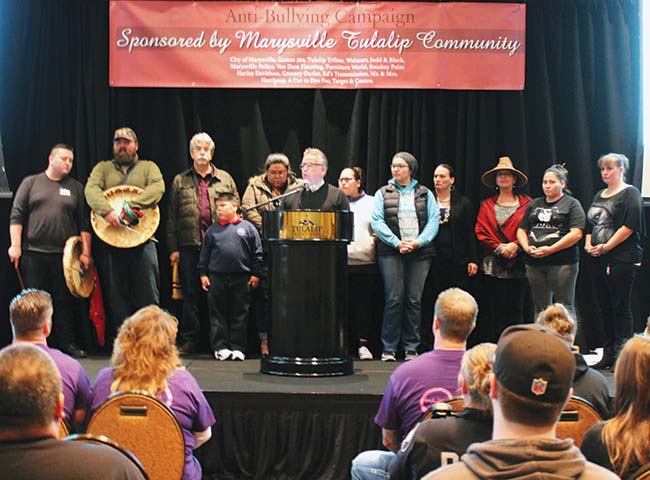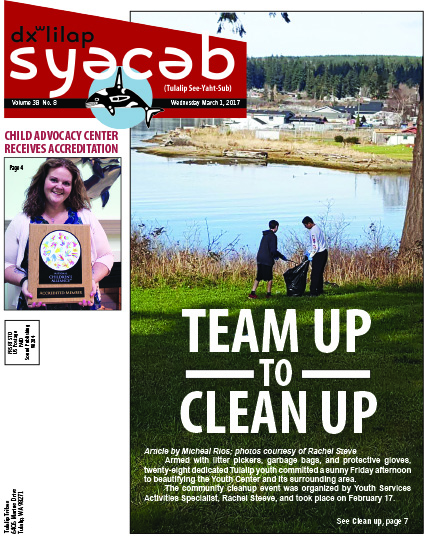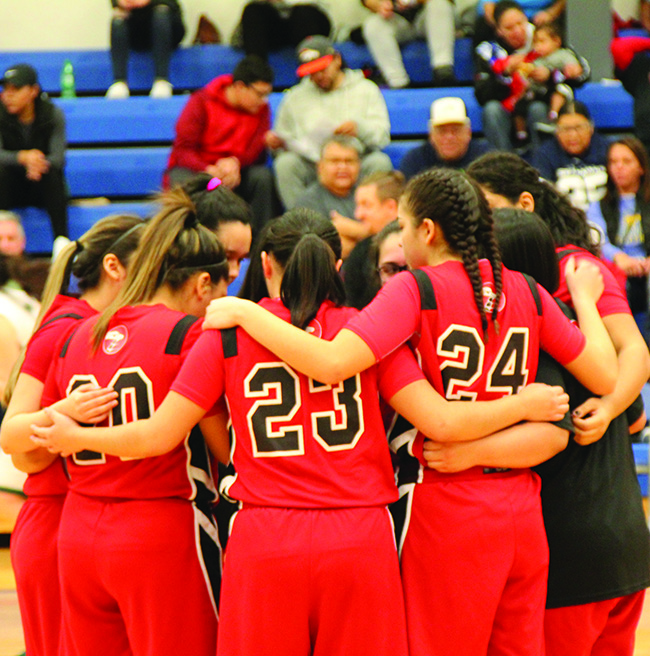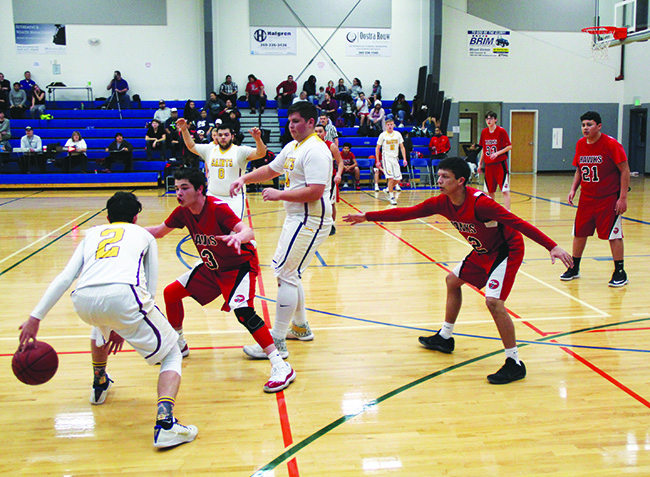Author: Kim Kalliber
Tulalip Tribal Housing 2017 Waitlist Update
Tulalip Tribal Housing 2017 Waitlist Update
Admin Building Room 162
Wednesday, March 8, 2017 from 10 am – 6 pm
Saturday, March 11, 2017 from 10 am – 2 pm
Questions? Call 360-716-4580 or you can email TTHD.
Contact Tawny Fryberg at tfryberg@tulaliptribes-nsn.gov
Or Shae Edwards Fryberg at sefryberg@tulaliptribes-nsn.gov
If you fail to update your file with TTHD with your most recent information,
your name may be removed from the waitlist and you will have to re-apply.
March 8, 2017 syəcəb
Please use the following link to download the March 8, 2017 issue of the syəcəb:
https://www.dropbox.com/s/o97hhtrc7537o1v/%20March%208%202017%20sy%C9%99c%C9%99b.pdf?dl=0
Lady Hawks fall to Neah Bay rally, 38-42
By Micheal Rios, Tulalip News
After taking 2nd at the District 1B Tournament, the Tulalip Heritage Lady Hawks (19-4) won their opening game in the Tri-District Tournament with a 40-27 win over Mt. Rainier Lutheran. In the 2nd round they journeyed to Port Angeles High School to take on the Neah Bay Red Devils (18-3). Tulalip and Neah Bay were evenly matched on paper. The Lady Hawks came into the game ranked No. 13 in the WIAA’s RPI, while Neah Bay was ranked No. 10.
They were pretty evenly matched on the court, too. In the 1st quarter, both teams were slow to get their offenses going and were notched up at 7-7 after eight minutes of play.
In the 2nd quarter, guards Myrna Redleaf and Keryn Parks got going and put their team ahead. Myrna connected on two 3-pointers and Keyrn hit two jumpers. Thanks to forwards Deandra Grant and Cyena Fryberg the Lady Hawks were winning the rebound battle and not allowing second chance opportunities for the Red Devils. Entering halftime Tulalip led 20-14.
Starting the 2nd half, Keryn found Deandra in the post for an easy bucket that gave them a 22-14 lead. From that point the Red Devils adjusted their game plan and started crashing the boards with extra effort. The Lady Hawks rebounding edge slipped away, and they got outscored 6-11 the rest of the quarter.
Leading 28-25 with only the 4th quarter to play, the Lady Hawks went to their main stays for offense. Keryn hit a base line floater and Deandra powered her way for back-to-back buckets in the post. With 4:43 remaining, leading 34-31, Deandra picked up her 5th foul on a very questionable blocking call. She led the team with 13 points when she fouled out.
Tulalip would struggle to find offense down the stretch without Deandra, while the Red Devils rallied with an 11-4 run of their own. In the super close game free-throws were a determining factor. On the game, Tulalip shot 7-22 from the charity stripe (and 0-5 in the 4th quarter), while the Red Devils shot 13-24 on free-throws (10-17 in the 4th quarter). The Lady Hawks battled valiantly, but just weren’t able to score in the clutch. They lost 38-42.
Keryn wound up leading the team in scoring with 14 points, Deandra had 13 points, and Myrna scored 7 points.
Tulalip bounces back with dominant 62-22 W
The Lady Hawks (19-5) once again traveled to Mt. Vernon Christian, this time to take on the Northwest Yeshiva 613s (15-10) out of Mercer Island. It was a loser-out game in the 3rd round of the Tri-District Tournament.
Tulalip’s offense once again started out slow, but the defense was very active limiting the 613s to only contested jumpers. Forward Deandra Grant anchored the offense in the 1st quarter with 6 of the team’s 8 points.
The same trend continued in the 2nd quarter, with the Lady Hawks leading 8-3, they continued to feed Deandra in the post and she continued to feast. With 3:02 remaining in the 1st half, Tulalip lead extended to 16-6 while Deandra had 12 of those 16 points.
At halftime the girls led 21-11 and had the dictated the game on the both ends thus far.
In the 2nd half, guard Aliya Jones got hot and helped turn the game into a total blowout. Aliya scored 14 points down the stretch, while her team outscored the 613s 41-11 over the 3rd and 4th quarters. Deandra’s 21 points and Aliya’s 20 points led all scorers and were big factors in their team earning a 40 point victory, 62-22.
The win gave the Lady Hawks back-to-back 20 win season, secured them a spot to Regionals and meant they were only one win shy of consecutive trips to State.
Successful season comes to an end for the Lady Hawks
On Saturday, February 25, the Tulalip Heritage Lady Hawks (20-5) played a Regional non-conference playoff game versus the Clallam Bay Bruins (15-5) at Jackson High School in Mill Creek. The terms were simple: win and earn your spot in State, or lose and go home.
During practice earlier in the week, center Cyena Fryberg fractured her foot and was relegated to a walking boot, leaving the Lady Hawks shorthanded on bigs.
In the 1st quarter, Tulalip got lots of point blank shot attempts. However, they weren’t converting. They only scored 3 points five minutes into the game, but luckily the Bruins were having their own difficulties scoring as well. The game was tied 3-3 with a little over two minutes to go in the opening quarter. The Lady Hawks failed to rotate on defense to defend the slashing Bruins players and gave up 8 quick points. Two Aliya Jones free-throws and a bucket from Deandra made the game 7-11.
Guard Keryn Parks hit a 3-pointer to open the 2nd quarter and get her team with 1 point, 10-11. Trading baskets the Lady Hawks took their only lead of the game 14-13 midway through the quarter. Unfortunately, turnovers became costly for the Tulalip girls as several bad passes led to easy transition points for the Bruins. The Bruins went on a 16-4 run to close the half, leaving the Lady Hawks trailing 18-29.
In the 2nd half, the Lady Hawks continued to turn the ball over, which ultimately spelled their doom. It’s incredibly difficult to win a game when you have nearly as many turnovers as shot attempts. To their credit, the Lady Hawks did a nice job of forcing a good amount of turnovers, too, except they weren’t turning those turnovers into points like the Bruins were.
Down 28-42 to start the 4th quarter, the Lady Hawks did their best to keep attacking and got the opportunity to shoot lots of free-throws down the stretch. In fact, Tulalip shot 18 free-throws in the game’s final minutes, but only converted 6 of them.
The girls managed to outscore the Bruins 13-10 in the 4th quarter, but it wasn’t enough as they would fall 40-52. The L marked the end of the season for the Lady Hawks. Keryn led all scorers with 15 points, Aliya scored 9 points, and Deandra added 8 points.
All in all, it was a very successful and entertaining season for the Lady Hawks and their fans. There were several riveting games that game down to the final few possessions, key players developed before our eyes, and a lengthy postseason run provided many memories for seniors Aliya, Myrna, and Cyena who are set to graduate this June.
A Gathering of Coast Salish peoples
By Micheal Rios, Tulalip News
Western Washington Tribes and British Columbia First Nations of the Salish Sea came together to speak with one voice at the Tulalip Resort Casino’s Orca Ballroom on February 27.
As one voice, the tribal leaders, activists, and caretakers of the environment spoke for the continued protection of the land and waters of our aboriginal homeland and the preservation of our culture. As brothers and sisters, they shared their culture and concerns for the endangered eco-region, and continued their dialogue on the need for strengthened environmental policies and practices in our ancestral homelands.
These Coast Salish ancestral homelands, the Salish Sea and its people continue to face detrimental damages to the environment and resources based on the pollution based economy, and they will continue to move on co-management and co-decision making on the Salish Sea. The agenda for the 2017 gathering was to discuss:
- Aboriginal and Treaty Rights at Risk
- Resource and Environmental Challenges
- Laws, Policy and Regulation
- Coast Salish 21st Century Nations and Tribes
- Federal, State and Tribal Dispute Resolution
- Decision making, uniform consent
Following the day’s seminars and presentations, attendees were treated to an evening filled with traditional song and dance. The next generation of Tulalip drummers, singers, and dancers opened, led by cultural specialist Chelsea Craig.
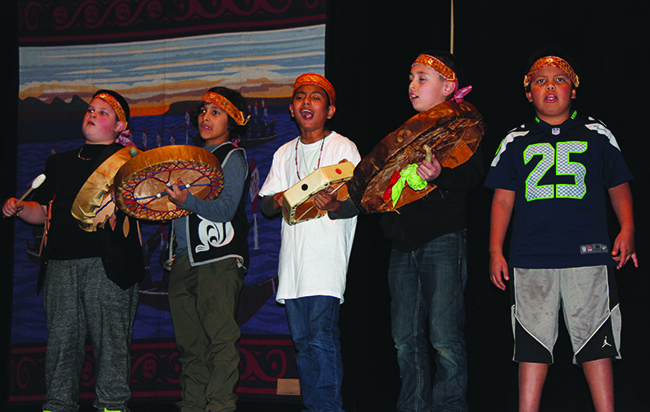
Succeeding the young and spirited Tulalip group was one of the top Native dance groups on the west coast, Git-Hoan.
“We are Git-Hoan, the People of the Salmon. We are a makeup of Tsimshian, Haida, and Tlingit people from southeast Alaska and are proud to be in your territory to sing and dance for you,” stated group creator David Boxley, a renowned Tsimshian artist and carver. “What a beautiful place to dance. Thank you for allowing us to be here.
“This dance group has been in existence since 1996. We use a lot of masks to tell our stories. All of our tribes, including [Tulalip], at one time danced with masks and this form of expression is coming back strong over the last decade. The songs and dances you are about to see are old in their origins, but relatively new in their make-up. Missionaries were very successful with our people. We are trying to change that by [revitalizing our culture] like how it was before the missionaries. We are proud of the fact we try really, really hard to look like the old days, with the masks and telling the stories like our people once did.”
Git-Hoan performed for nearly an hour to the marvel of gathering attendees. Included in their selection of dances was a brand new song debuted for the Coast Salish occasion.
“We are the People of the Salmon, and so are you. We are all People of the Salmon,” explained Boxley. “Historically, our ancestors’ lives depended on the salmon. The next song we are going to show is a brand new song that shows our pride in being People of the Salmon .We dedicate this song to all of you.”
With the conclusion of the day’s events, Board of Director Theresa Sheldon shared her amazement in watching the performances by several Coast Salish tribes.
“It’s always a blessing to see our young students singing our ancestors songs, especially for this Coast Salish Gathering. A gathering that’s all about our Mother Earth and how we can work together on protecting our waterways. It was truly a delight to witness the Alaskan group perform their traditional mask dances. They had the most amazing raven dance, with the mosquito ancestor dance, and the supernatural eagle dance. It’s truly an honor when our relatives bring out their masks to share with us. Sharing our songs and dances together is the way of our people. I’m so thankful to the parents and teachers who help our young ones embrace this.”
Music Therapy Offers Healing to Tulalip-Marysville Community
By Kalvin Valdillez, Tulalip News
The Snohomish County Music Project is using music as a tool to strengthen the Tulalip and Marysville community. With over fifteen programs, the Music Project has dedicated their time to improving the mental well being of Snohomish County community members through music therapy. The Marysville School District originally reached out to the Snohomish County Music project when looking for alternative therapy for children who have experienced trauma in their young lives. Music Therapy is now offered to many schools in the Marysville School District including, Marysville-Pilchuck, Quil Ceda Elementary, and Marysville Arts and Technology.
Quil Ceda Elementary student, Oliver walked into a spare room of his school’s library wearing a visibly huge smile. As he took his seat, Music Therapist Victoria Fansler handed him a stack of cards. Each card displayed a cartoon making facial expressions with the corresponding emotion (i.e. happy or sad) written in text beneath the cartoon face. As his instructor retrieved her guitar from its case, Oliver examined the cards. Once he picked two cards out of the deck, Victoria began strumming her guitar to an interactive welcoming song between teacher and student, pausing only for Oliver to respond to questions within Victoria’s lyrics. When her song reached the question ‘how are you feeling today?’ he revealed the cards he had chosen, excited, because he was in Music Therapy class and upset because his aunt postponed her visit with him until the weekend.
This warm-up exercise allows the student to express their emotions and presents them with the opportunity to explain why they are feeling those emotions. Victoria begins each of her sessions with this exercise as the majority of her students from the Marysville and Tulalip community happily sing along. At the end of each session she remixes the welcome song to recap the session and say ‘goodbye until next week’.
Tulalip Cares Charitable Contributions recently funded Victoria’s music therapy program through the Snohomish County Music Project. She is currently working full time in the Tulalip-Marysville community helping students work through traumatic life events by using music as an instrument of healing.
Countless studies have shown that music therapy has assisted many victims of trauma. While focusing on music individuals are able to relax, therefore reducing stress and anxiety levels. Music therapy provides an outlet for individuals to express their emotions creatively.
Victoria also provides services to the Betty J. Taylor Early Learning Academy once a week and works primarily with students who are currently, or have previously been, involved with Child Protective Services or beda?chelh. In cases of neglect, children are sometimes unaware of social cues, such as facial expressions and vocal tones. For this reason, Victoria incorporates mirroring into her lesson plans, to help the children at the academy recognize emotions that others display.
In elementary schools, Victoria teaches the children how to express their emotions through music. Oliver, for example, is a huge Eminem fan. In his individual session Oliver wrote down and illustrated everything that makes him feel safe as well as his fears. While working on the assignment a Bluetooth speaker played a cover, performed by kid YouTube sensation Sparsh Shah, of Eminem’s ‘Not Afraid’. Oliver is familiar with the Eminem song and because of the tools music therapy has provided him, he was able to write his own lyrics to the track. Oliver said that those particular lyrics that he wrote are in memory of his little brother who passed away when they were both at a young age.
Aside from her acoustic guitar, Victoria uses a variety of instruments in her sessions including a melodica. The free-reed instrument is essentially a keyboard that requires users to blow air into it for sound output, much like a wind instrument.
“A lot of people suggest meditation and focused breathing for children with trauma, but I found that sometimes it can be hard trying to convince kids that sitting still and breathing quietly will help them feel better. The Melodica is really engaging, if you hold a long exhale breath it makes a really pleasant sound that lets you explore the keys and get creative while playing it. This helps build self-awareness so the kids can feel comfortable self-expressing musically and recognizing what tools they already have within themselves,” Victoria states.
Another instrument that assists with trauma recovery is the drum. Victoria explains, “We use a lot of rhythm because we know, neurologically, what trauma does to the brain. For example, when we have a flashback and trauma is overtaking the mind and body, the part of the brain that tells you what time and place you’re in, basically shuts off. With rhythm and drumbeats it forces us to engage in the present moment, our brains can’t help but track how fast the beat is going. We call that entrainment. It keeps us from being stuck in the past with our traumatic memories and how they might make us feel. Through entrainment we help our clients realize that although a traumatic event occurred, it is in the past and it is not going to hijack their brain at any given moment anymore.”
The Snohomish Music Project offers a variety of programs countywide including music therapy services for infants, children, teens, Veterans suffering with posttraumatic stress disorder, as well as senior citizens suffering with memory-related illnesses. The non-profit’s headquarters is located at the Everett Mall and hosts live music performances weekly. Since 2010 the Snohomish County Project, previously known as the Everett Symphony, has refocused their time and energy to help heal and strengthen communities.
“Rather than using music as tool to provide performances, we have transformed and provide a way to use music as a tool to help community members thrive and to help make impactful changes in the community. We are able to help individuals better themselves and they in turn become positive contributors to our community,” states Snohomish County Music Project Director, Vasheti Quiros.
Victoria is making a positive impact in the community through music therapy and because of its popularity and high demand, (she has over twenty kids on a waiting list at the early learning academy) Victoria hopes to expand her program and open services to the entire Tulalip community. She currently is in talks with Youth Services about hiring youth of the community, with hopes of training them to become music therapists.
For additional information about the Snohomish County Music Project please visit their website www.scmusicproject.org
Former Pro Wrestler Marc Mero Lays the Smackdown on Bullying
By Kalvin Valdillez, Tulalip News
Prizewinning posters created by students of the Marysville School District (MSD) were on display in the Orca Ballroom of the Tulalip Resort and Casino. The posters promoted anti-bullying messages such as make bullying extinct, stop cyberbullying, and you don’t have to touch someone to hurt them.
The recent Anti-Bullying Community Campaign Event drew large amounts of families from the Tulalip-Marysville community as many were excited to see special guest speaker, former professional wrestler Marc Mero.
Last year MSD School Resource Officers, law officials assigned to the school district, attended an anti-bullying conference in Florida because the cyberbullying epidemic reached the school district and quickly became an issue among many students.
During the conference, the School Resource Officers heard Mero share his inspirational life story, told to assist with bullying prevention and encourage the youth of America to make smarter life decisions. Following Mero’s speech, the officers made it their top priority to bring the WWE Champion to Washington State to talk to students in school district about bullying. Marc presented his message at middle and high school assemblies throughout MSD before concluding with the Tulalip Resort and Casino event.
“Show me your friends and I’ll show you your future,” stated Mero as he urged the youth in attendance to be mindful of the company they keep. Mero, professionally known as Wildman Marc Mero, created a wish list at a young age that contained both his dreams and future dream purchases. Among the various items on the purchase list, stand-outs included a black Cadillac and a house for his mother.
“I was bullied very badly as a kid. My mother worked two jobs to support my siblings and I. We didn’t have a lot of money so we got a lot of our clothes from garage sales,” he remembers. Marc explained that because his classmates discovered he wore articles of clothing they once owned, they nicknamed him ‘bum’, likening his used attire to a homeless person. However, young Mero was able to channel those emotions, triggered by his bullies, into sports. Excelling in a variety of sports, he found his true passion in boxing and fought his way to a New York amateur championship match. Due to an accident that resulted in a broken nose, he was unable to fight for the championship title.
Although he had intentions of returning to the boxing ring, he was restricted from fighting for a year per doctor’s orders. Marc used that time to rekindle old friendships and quickly spiraled into drug and alcohol addiction. He watched ten years of his life pass by, along with any boxing comeback dreams. It was while flipping through television channels that he first watched, and decided to pursue a career in, professional wrestling.
After months of hard work and determination, Mero began to quickly climb to the top of the wrestling world, facing opponents such as The Rock, Stone Cold Steve Austin and Triple H. He was meeting celebrities, making upwards of millions of dollars and married professional model and female wrestler Sable. Most importantly he was finally able to purchase a brand new house for his mother as well as the car of his dreams, the black Cadillac.
Association with the wrong crowd once again led to Mero’s downfall. This time his addiction led to three overdoses, neglected relationships, and a divorce. During his rise to fame Marc would sometimes avoid returning phone calls and letters to his mother and siblings. He would often skip family events such as his brother’s baseball games and his sister’s high school graduation. Marc revealed that at the height of his professional career, he lost his mother due to lung cancer, his younger brother to a head trauma accident and his younger sister to cancer.
“When it all comes down to it, life is about the choices you make. I missed out on the greatest years of my sister’s life, of my brother’s life, and for what? To go and get high?” He continued, “I was a bully too. I bullied my family. All they wanted to do was play catch with me or sit next to me. I was so mean to them and I regret it every day. I would tell them to quit bugging me or I would tell them to go away. What I would give to go back in time and throw one ball to my brother or hold my sister tightly while she sat next to me. Make sure the people that you surround yourself with will build you up and not tear you down,” he urged.
Marc spoke about the emotional harm bullying causes, stating that suicide is currently the third leading cause of death amongst teenagers in the United States. And the majority of suicide deaths are bully related. Mero invited mother and schoolteacher Amy Briggs on stage to share a story about her son Daniel. At the young age of sixteen, he had been ruthlessly bullied for years from his peers in school. Daniel was often told to ‘kill himself’, verbiage that is unfortunately seen quite often among high school students nationwide across various social media platforms.
One night Daniel received a text from a classmate asking him to save the world from misery by ending his life. He replied stating the world would not have to worry much longer because he was planning to take his life soon. The classmate responded ‘put up or shut up’. The next day Daniel told other classmates of his intentions and was met with similar reactions. And that afternoon, while his parents were at his brother’s basketball game, Daniel died from a self-inflicted gunshot wound.
As tears streamed down many faces of event attendees, Amy urged parents who have children that are constantly harassed online or at school, to join forces with other parents to put a stop to bullying. “There truly are some teachers and administrators who don’t believe bullying is really a problem. My voice was only heard once or twice but you can’t ignore three hundred voices in a board room at the same time,” she stated.
Mero explained that sometimes when kids bully other kids, it is because they are victims of bullying themselves. He advises that a one-on-one conversation between a bully and an adult can lead to both the revelation of the issue causing the harassment as well as a solution to the issue.
Before thanking the crowd for their attention to this serious issue, Marc gave a possible explanation as to why some kids attempt suicide. “Maybe their parents are going through a divorce, maybe they had a death in the family, maybe they lost their pet, maybe they have a medical condition [their bullies] know nothing about. And it’s that one text, that one message that pushes them over the edge. Behind every text are real people with real feelings,” he stressed to the youth.
For more details about the life and career of Wildman Marc Mero, including information about his organization Champion of Choices, please visit www.thinkpoz.org
March 1, 2017 syəcəb
Please use the following link to download the March 1, 2017 issue of the syəcəb:
https://www.dropbox.com/s/pz8vixt27fn2kft/March%201%202017%20sy%C9%99c%C9%99b.pdf?dl=0
Lady Hawks Take 2nd at Districts, Move on to Tri-Districts
By Micheal Rios, Tulalip News
After winning their first two games of the District 1B Basketball Tournament, the Tulalip Heritage Lady Hawks (18-3) earned the right to play in the District 1B championship game, held at Mt. Vernon Christian High School. Their opponents were the Lions of Cedar Park Christian (19-1).
These teams played twice during the regular season with the Lady Hawks giving Cedar Park their only L on the season with a 41-23 victory at Francy J. Sheldon gymnasium back on January 6. Then they played three weeks later, this time at Cedar Park’s home court, and the Lady Hawks succumbed to a 15-31 defeat.
The third matchup of these two teams was as intense as can be expected from a pair of league rivals playing with the District 1B championship on the line. In the 1st half, Tulalip opened the game executing their offense and jumped out to a 10-4 lead. Back-to-back stolen passes led to two easy buckets for the Lions that shrunk the Lady Hawk lead to 10-8 to start the 2nd quarter. Tulalip’s defense was making it very tough to score in the half court, while forward Deandra Grant was getting her looks from the post. At halftime, Tulalip led 18-13.
In the 2nd half, the Lady Hawks turnovers changed the pace of the game. The Lions adjusted their own defense to press the Tulalip guards and not allow them to shoot from the perimeter. That adjustment led to the Lady Hawks forcing and sometimes telegraphing passes that were picked off by the Lions players and resulted in transition buckets off the turnovers. Having scored only 13 points in the entire 1st half, the Lions scored 18 points in the 3rd quarter and 13 points in the 4th quarter.
Meanwhile the Lady Hawks offense just wasn’t able to pick up the pace. Guard Aliya Jones got aggressive and scored six straight points, but quickly fouled out to start the 4th quarter. Tulalip fell to Cedar Park by the score of 36-44, resulting in a 2nd place finish to the tournament and a spot in Tri-Districts.
The Lady Hawks (18-4) had three days to practice and prepare before hosting a Tri-District Tournament game versus Mt. Rainier Lutheran (13-10). Coming off the loss to Cedar Park Christian, the girls were eager to move forward and put that game behind them.
In front of a jam packed home crowd cheering them on the girls responded with a quality bounce back game. In a back and forth battle through the first two quarters, the Lady Hawks held a slim four point lead at halftime, 23-19.
Coming out of halftime, Tulalip’s defense clamped down and made nothing easy for Mt. Rainier Lutheran. In fact, the Lady Hawks held their opponent to just eight total 2nd half points. Offensively, forward Deandra Grant was at it again bullying the smaller defenders in the post and commanding a double team. Led by Deandra’s game high 18 points and Myrna Redleaf’s 10 points, the Lady Hawks secured a 40-27 win and moved on to the 2nd round of the Tri-District Tournament.
Hawks Take 5th at Districts, Play One at Tri-Districts
By Micheal Rios, Tulalip News
After an impressive second round 20 point win, 59-39, over rival Grace Academy, the Tulalip Heritage Hawks (9-12) faced off against the Orcas Christian Saints (10-7) in the 5th place game at the District 1B Tournament.
The Hawks lost both previous matchups, 39-50 and 51-53, to the Saints during the regular season. However, with the boys’ recent offensive surge they were optimistic they could take down the interleague foe.
In the 1st quarter, Tulalip jumped out to an 8-2 lead that was extended to 13-4 thanks to well executed offense and guard Josh Iukes setting up his teammates. The Saints responded with a 11-4 run, capitalizing off of Hawk turnovers, that saw Tulalip’s lead shrink to 2 points, 17-15. After a Hawk bucket to go up 19-15, the Saints again went on a run, this time 8-2, to take a 23-21 lead going into halftime.
During the halftime intermission, the team talked over some 2nd half adjustments and were determined to not let this game slip away. There was an added emphasis on pushing the ball offensively and taking advantage of the Hawks’ superior quickness.
In the 2nd half, Tulalip responded to the in-game adjustments and took complete control of the game. After being down 21-23 to start the half, the Hawks outscored the Saints 36-12 down the stretch. The offense was clicking on all cylinders and the defense did its job. When the final buzzer sounded, the boys had come away with a decisive 57-35 win to claim a 5th place finish in the tournament and secured a berth to Tri-Districts.
The Heritage Hawks (10-12) entered the 1B Tri-District Tournament as the #12 and final seed, as such they traveled to Tacoma Baptist to play the #6 seed Crusaders (15-8).
Tulalip found themselves trailing 0-9 early and then 7-21 at the end of the 1st quarter. The offense got going in the 2nd quarter, but there were no answers on defense to slow the Crusader attack. At halftime the boys trailed 23-45 and went on to lose the game 56-83.
With the loss, the season came to an abrupt end for the younger Hawk squad who managed a very respectable four-game postseason. After turning their play around mid-season for the better, the Hawks found an identity and got very valuable experience for the younger players. If everyone returns to play next year, then expectation has them poised to contend for the league title.








